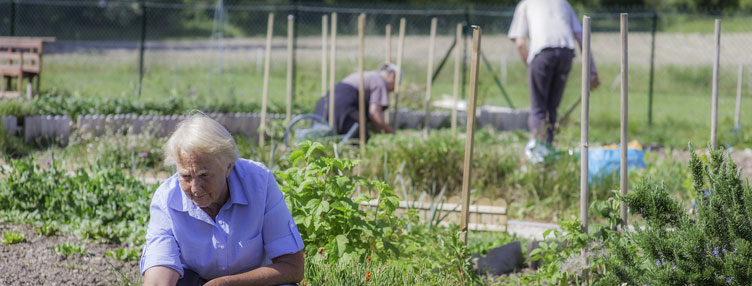Keeping a sense of self
The person with a diagnosis of dementia is first and foremost a person – was, is and will continue to be.
They have a lived history – a culture, family, personality, emotions, experiences, stories, memories and much more – that has meaning to them.

It is important to build on the things that have meaning. The person living with dementia might like attending church, or a mosque, or a synagogue, or a temple, or meditating. They might prefer their own company, or they might love a crowd. They might relish routine or prefer spontaneity. They might enjoy work, volunteering, listening to music, a hobby, bushwalking, creating beautiful things, gardening or caring for others.
Whoever they are and whatever their story, a person living with dementia will be happiest if they can be themselves, and be recognised for the person who they are.
Practice points
Allied health professionals:
- can take a wellness approach to provide person-centred dementia care
- can provide health care in accordance with the ‘10 principles of dignity in care’ (1:p12).
A wellness approach in dementia care
- emphasises the person and what they can do, ahead of the presenting health issue and what they can’t do
- uses a rehabilitative framework to maximise independence and quality of life by giving a person the opportunity and confidence to retain and regain some of the skills they may have lost or be at risk of losing, or to develop alternate strategies where skills are gone
- focuses attention on what is meaningful to the person and what contributes to their wellbeing
- includes reablement and restorative care.4
A person-centred approach
- puts the person in the centre of care
- treats people as partners in health care
- works alongside them to improve quality of life
- empowers people to make choices for living a healthy life
- enables engagement in occupations, activities and relationships with consideration of a person’s capacity, culture, interests and life story.
Noelene's story
Noelene loves music, loves to sing and to dance. She always has. Her house was full of music and she used to sing her children to sleep every night. Noelene’s love of music and singing has not changed even though some other things have changed, like her memory, managing day to day tasks and preparing and eating food. When Noelene’s skills in using her CD player changed, her son and daughter put all her music onto an iPod and with the press of just one button, Noelene could continue to enjoy all the music she loves.
Noelene’s daughter noticed that her mother liked singing new songs on the radio and remembered all the words, even though she was not remembering other things. Her daughter contacted Amee, a neuropsychologist who was conducting some research. Amee taught Noelene a new song that she’d not heard before and Noelene was able to sing along to that song two weeks later.
Comment from neuropsychologist AmeeNoelene could not recall three words after a three minute delay and did not know who I was; but she could sing along to the song I had taught her two weeks before. This is very exciting as learning new information is something that is typically difficult for someone with severe dementia. Involving Noelene in singing has been a key ingredient of her happiness in residential care and of retaining the essence of who she is by engaging her in doing the thing she loves.
- ‘Reablement includes time limited interventions targeted towards a person’s specific goal to adapt to functional loss or regain confidence and capacity to resume activities. Restorative care involves evidence based interventions led by allied health professionals that allow a person to make a functional gain or improvement after a setback or to avoid a preventable injury.’ (1: p52)
The National Dementia Helpline is an Australian Government funded initiative.

